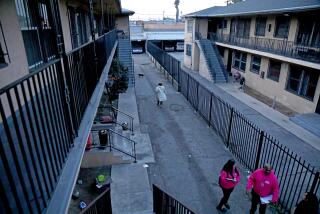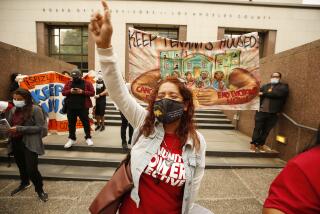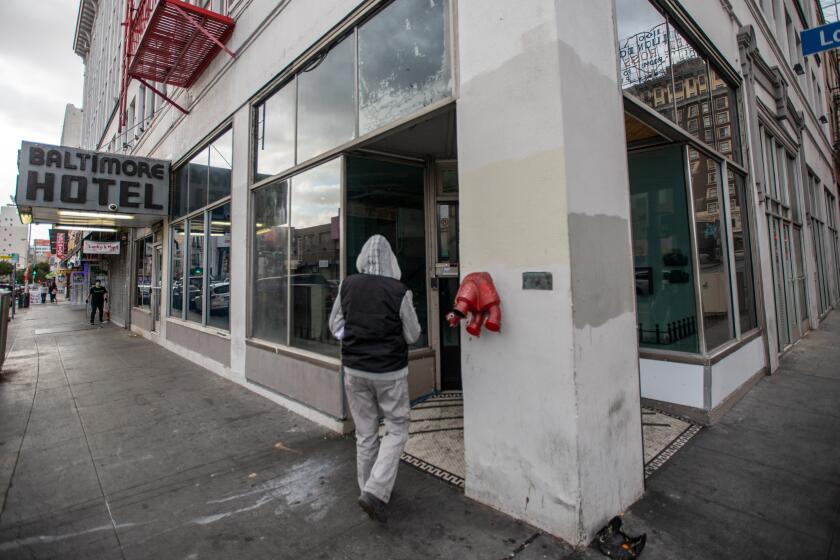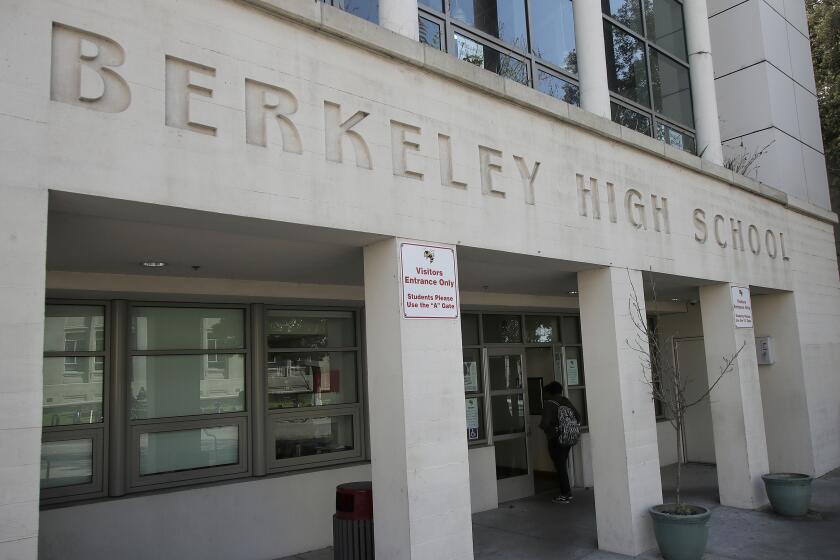Eviction court is back. Financially struggling tenants remain protected, for now
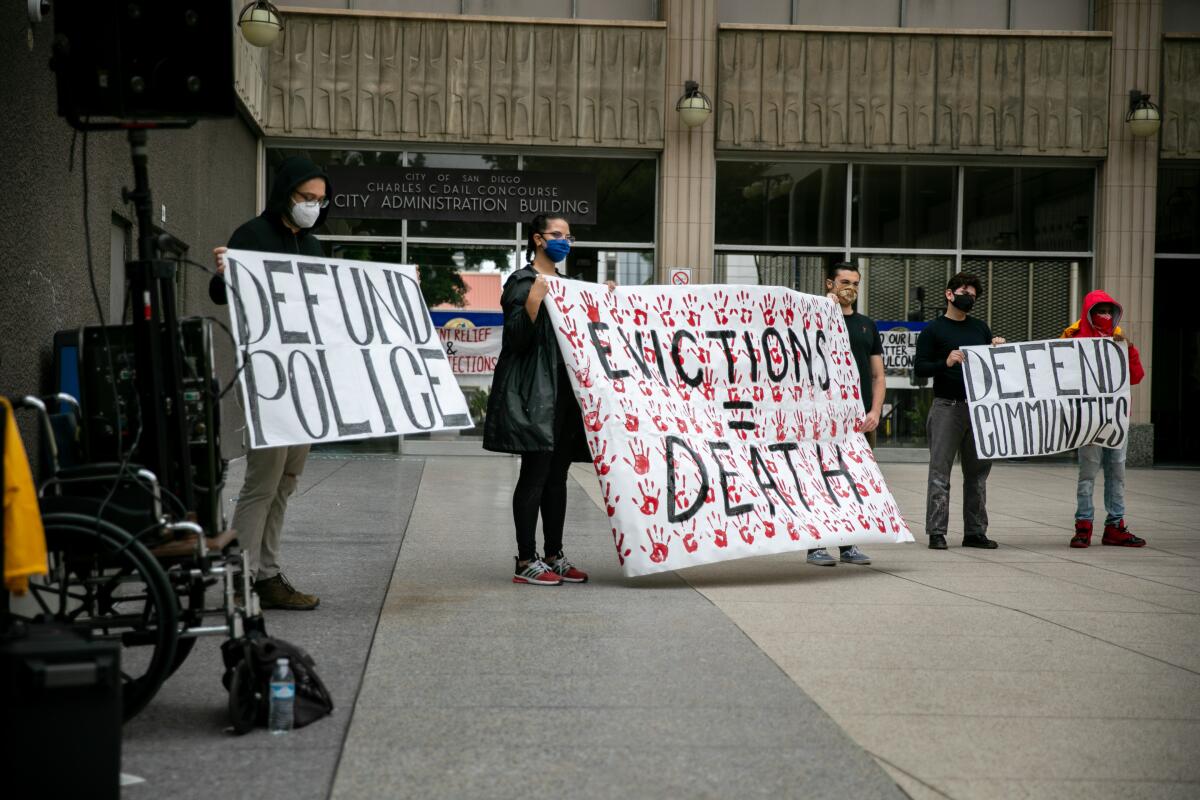
California’s courts are resuming eviction hearings this week, but a flurry of new protections could ensure that financially struggling tenants will not lose their homes, at least through the rest of the year.
Gov. Gavin Newsom on Monday signed urgent legislation aimed at preventing landlords from throwing out tenants who’ve been financially affected by the novel coronavirus. And on Tuesday, citing the risk of increased homelessness, overcrowding and the potential spread of COVID-19, the Trump administration announced a moratorium on all pandemic-related residential evictions nationwide through the end of 2020.
The new rules cover an estimated 17 million tenants in California and 40 million across the country. Because they apply so broadly, the measures provide basic protections for all tenants who previously had to decipher an uneven patchwork of rules governing who was allowed to be evicted and when.
But enforcement of the new regulations remains complicated and leaves significant gaps. None of the new efforts waive rent payments, which could result in huge debts for tenants that ultimately need to be made up. For their part, landlords are receiving slim relief for their own mounting bills. And the state program could require completing an elaborate legal process to qualify for relief, worrying tenant advocates who point to studies showing that upwards of 90% of renters don’t have lawyers in eviction cases.
Here’s how tenants and landlords can navigate the new rules.
What should a tenant do if they haven’t been paying rent or won’t be able to for the rest of the year?
The simplest answer: Tell your landlord.
The new federal rules provide the easiest option. To qualify, tenants must expect to make less than $99,000 this year. Affected tenants have to notify their landlord in writing that they’ve lost income due to COVID-19, and will have unstable housing if they lose their apartment. The Centers for Disease Control and Prevention has published the form tenants need to fill out, and it’s accessible through the federal register.
Once the tenant does this, they’re protected from eviction until Jan. 1, though all unpaid rent would be due then.
Even though the federal program is simple, the new state and some existing local government protections in California are more generous for tenants.
What extra protections do renters get under the new state rules?
Landlords can’t evict tenants under the new state law if they didn’t pay their rent from March through August. Importantly, like the federal program, these rent debts don’t go away. But unlike the federal rules, landlords can never evict tenants for this overdue rent. Instead, landlords can take their tenants to small claims court to collect what’s owed as early as March 2021.
For rent between now and the end of January, the state rules are a little more complicated. They require tenants to pay at least a quarter of the rent owed during that time. The money, however, isn’t due until the end of January. In other words, tenants are able to avoid getting evicted for missed rent payments during the next five months as long as they pay a quarter of what’s owed by Jan. 31 — even if the payment comes in one lump sum on that date.
In theory, this means that landlords could not begin evicting tenants for unpaid rent related to the pandemic until February.
Again, even if the tenant is able to pay a quarter of the rent needed to prevent their eviction, landlords could still try to collect the remaining debt in small claims court in the future.
What’s the catch?
Though landlords are barred from pandemic-related evictions, they can now initiate eviction proceedings — even for unpaid rent — that they believe are unrelated to COVID-19. To protect themselves, tenants have to make sure to respond to formal eviction notices.
Before going to court, landlords must give renters 15 business days to respond with a letter attesting to their financial hardship due to COVID-19. Tenant households that earn greater than $100,000 — or even more in counties with higher median incomes such as those in the Bay Area — may have to provide additional documentation to demonstrate they’ve been economically affected by the pandemic.
It’s possible that landlords could file an eviction notice every month going forward if a tenant doesn’t pay rent. In that case, a tenant would have to respond each time to ensure they’re protected.
On Wednesday, the Newsom administration announced a new informational campaign and website called “Housing Is Key” to inform tenants and landlords of their rights under the new state program.
So what eviction cases can move forward?
Landlords can bring cases against tenants for anything besides not paying rent. Landlords have been frustrated that they’ve been unable to oust tenants for property damage, criminal activity and other lease violations. They’re allowed to do so now unless a city has passed additional prohibitions against other forms of evictions.
What’s next?
It took frantic negotiations over the past couple weeks for Newsom, state legislators, landlords and tenant groups to reach a deal to avert a wave of evictions that, by one estimate, could ensnare 5.4 million renters in California.
But all sides involved in the effort called the new law a stopgap that could allow lawmakers to come up with a more comprehensive proposal once they begin debating legislation again in January. The governor and legislative leaders are pinning their hopes on more financial assistance from the federal government by then.
“As significant as these new protections are, we acknowledge that the COVID-19 pandemic will still lead to some foreclosures and evictions, causing great pain for the families experiencing them,” said Newsom, Senate President Pro Tem Toni Atkins (D-San Diego) and Assembly Speaker Anthony Rendon (D-Lakewood) in a statement announcing the eviction deal last week.


